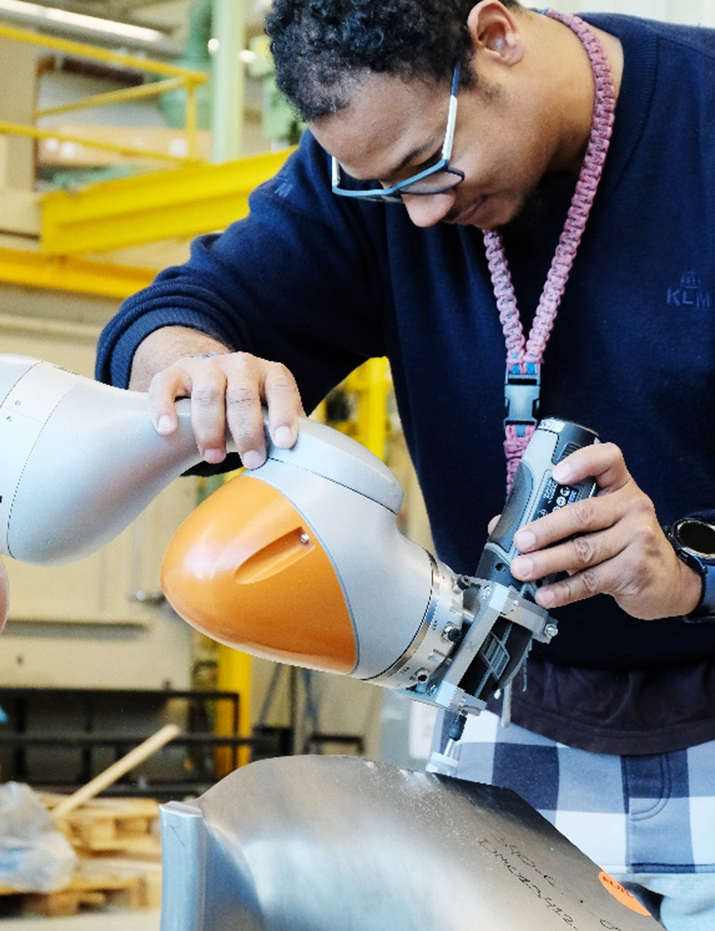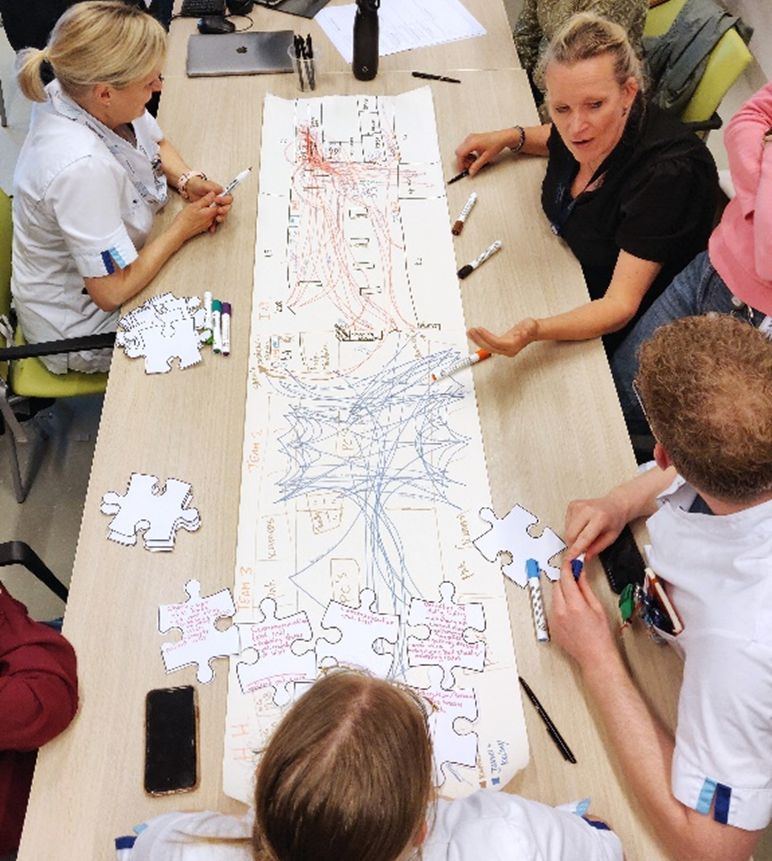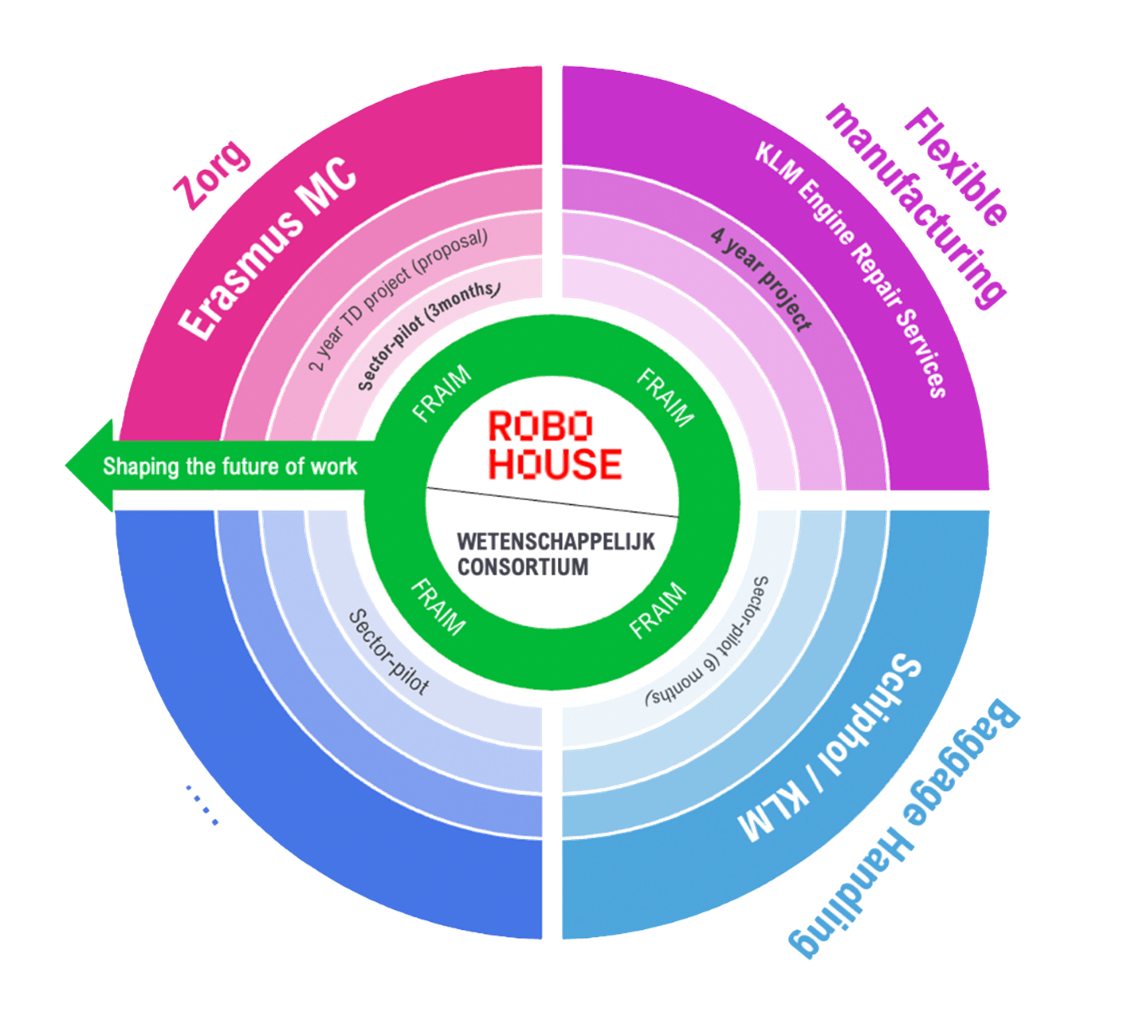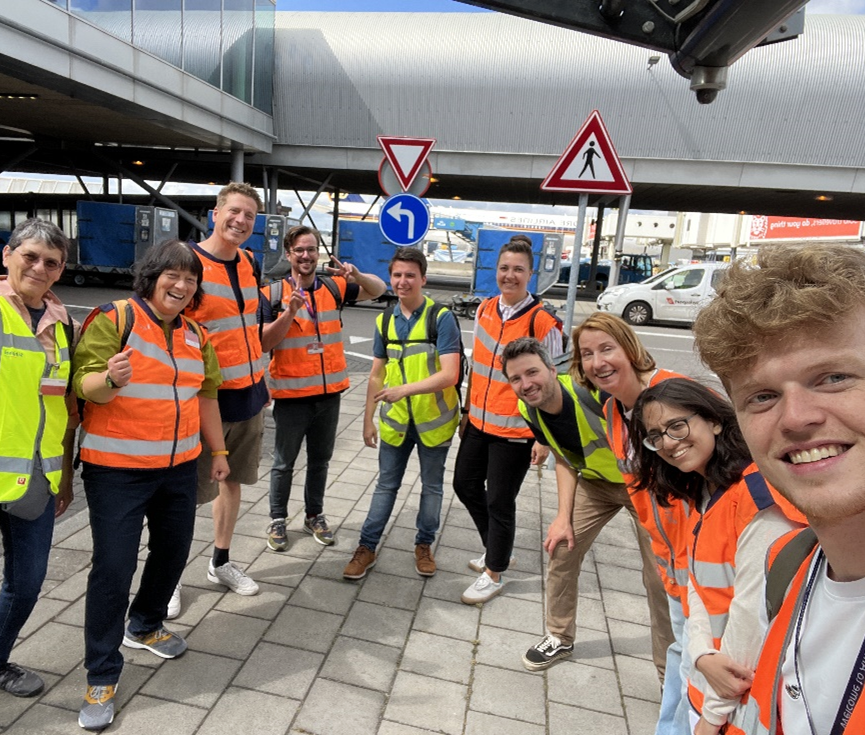FRAIM: Shaping the future of work
In a time of complex societal challenges around an aging population and a growing shortage of workers, we need to rethink how we live, consume and work. Technological developments may help to address these challenges, but physical work performed by people will remain crucial for vital sectors such as healthcare, cleaning, logistics and flexible manufacturing.
FRAIM is a transdisciplinary research and innovation centre, which aims to understand and shape a future of physical work that is meaningful, just and viable – with and for workers. The insights that FRAIM provides for the future of work can be technical (robotics, artificial intelligence), but also organizational or psychological.
FRAIM
- Currently focusses on physical work processes, and the potential for emerging robotic capabilities to assist workers.
- Has a physical hub in field lab RoboHouse at the TU Delft Campus (The Netherlands).
- Learns about and aims to improve the attractiveness of current and future physical work in different sectors, through integrated research, innovation, and education.
- Includes the workers whose work we are shaping.
- Combines quick innovation sprints with long-term transdisciplinary knowledge.
FRAIM is led by scientific director David Abbink and operational director Ties van Bruinessen, and is organised as an open network based on a growing community that jointly takes responsibility for the future of work. Since spring 2021, when FRAIM was initiated at the Technical University (TU) Delft (by David Abbink and then-time RoboHouse director Jaimy Siebel), we have been nurturing that community, weaving together academic and innovation practices. We leverage a wide network of stakeholders in our projects: employees from different organisations and hospitals, labour unions, governments and policy makers, and wider academic communities.
Complex societal challenges
FRAIM is working on complex societal challenges to create the future of work. For example, labour shortages are depending on countless interrelated factors with many potential routes for interventions. In many countries such as The Netherlands, labour shortages are expected to further increase in the coming decades due to:
1. Shrinking labour participation.
2. Workers that abandon crucial physical work.
3. A labour productivity that has been stagnant since the ‘90’s.
To help address current and future labour shortages, the expectations around emerging technological capabilities in robotics and artificial intelligence are huge. Often, such technologies are seen as a quick fix, but in practice turn out to be more difficult. Work processes are often so complex, varied, and dynamic that they are beyond current capabilities of robotics, even in cutting-edge academic labs, let alone in commercially available products. As a result, the innovation, implementation, and adoption of robot systems alone does not lead to the desired impact.

Different experiences among those involved
There is a deep disconnect between different types of experience and knowledge among the people who are involved:
- Those that commission and fund technology developments (organisations and society).
- Those that design emerging technological capabilities (design and engineering).
- Those that innovate and implement that technology (innovators and implementation experts).
- Those who study its impact on work and organisations (social scientists).
- Those that get confronted with working with that technology (the workers).
As a result, workers typically have little choice in this process, and are too often confronted with technology of which the impact on their work is not well-understood. This can impact their wellbeing (e.g., in terms of autonomy, variety in activities, social relations on the work floor) in the short- or long-term. This disconnected landscape currently lacks a coherently organised responsibility for understanding and shaping the directions for future work, which is currently left to technology-push and market-pull.
Transdisciplinary FRAIM approach
To responsibly shape a meaningful, just, and viable future of work – an integrative mission-driven effort is needed. At FRAIM, we aim to bridge these gaps and bring together the parties that jointly can understand and shape the future of physical work, tackling this complex societal challenge.
That means we take a transdisciplinary approach: integrating academic knowledge (engineering, design, and social sciences) with pragmatic knowledge from workers, organizations, through co-created and co-decided innovation processes. We aim to connect learnings about the future of work from different sectors, to cross-fertilise insights and provide a more impactful knowledge platform.
Therefore, we appoint and supervise transdisciplinary taskforces: a tight-knit team that visits the work floor together, builds relations with workers to jointly learn about current and future work – and how technology might impact that.
Our transdisciplinary team consists of:
- an engineer (typically robotics, or human-robot interaction)
- a designer
- a work psychologist
- an organisational scholar
- a domain specialist for the sector we are working with (e.g. nursing scientist when engaging with future of nursing work, or operations research when engaging with future of baggage handling)

The team works together with (and are guided) by at least three senior experts: in innovation, academic research and in knowledge integration.
Long-term knowledge and short-cycle sprints
We pursue a combination of long-term knowledge integration (academic research and transdisciplinary learning) with short-cycle innovation sprints (learning-by-doing), that strengthen each other:
- Long-term knowledge: Our academic expertise is grounded in an interdisciplinary Dutch consortium of 35 leading scholars in engineering, design, work psychology, organisational science (involving four faculties in TU Delft, as well as TU Eindhoven, University of Twente, Erasmus University Rotterdam and Radboud University Nijmegen). This consortium is led by prof. dr. ir. David Abbink and has engaged in both interdisciplinary research and transdisciplinary research for over two years, in three sectors so far.
- Short-cycle innovation sprints: Our innovation expertise is grounded in field lab RoboHouse , which stands for a specific type of innovation: using worker-centred co-creation based on shared decision-making. RoboHouse is located on the TU Delft Campus, and combines expertise in supporting academic research, facilitation of education & training, community building, and tech transfer. RoboHouse is led by dr. ir. Ties van Bruinessen and provides the physical hub for FRAIM.
How we work
We embrace the future of work as a complex societal challenge, meaning that we believe in:
- Mission-driven research and innovation: Our shared mission is anchored in an actionable vision towards a future of work that is meaningful, just, and viable.
- Note we do actively engage with networks characterised by curiosity-driven research and technology-driven innovation, yet we aim to leverage such approaches in pursuit of our larger mission.
- Transdisciplinary knowledge integration, through:
- Interdisciplinary, value-driven academic research: We see physical work practices as occurring in an inter-connected ‘triangulation’ between workers, organisations, and technological capabilities – all capable of learning and change. We call these emerging phenomena “Worker-Robot Relations”.
- Worker-Centric Practices: We involve workers as the experts they are, best suited to creatively guide developments in their future of work.
- Learning-by-Doing: We combine quick innovation sprints with long-term disciplinary, interdisciplinary, and transdisciplinary knowledge. We organise our approach to allow for emergent knowledge, meaning we can work with what arises in the moment. This is hard to plan for, but key to recognise and use for further steps.
Track Record in Transdisciplinary Research and Innovation
We take pride in the track record we are building in transdisciplinary research and innovation projects, having successfully collaborated with the following organisations:
- KLM Engine Repair Services, with and for workers in engine repairs (fall 2022).
- Erasmus Medical Centre, with and for nurses (spring 2023).
- Schiphol Baggage Handling, with and for baggage handlers (fall 2023). Read more about this project.

Get involved and contact us

Whether you would like some more information about possible collaboration, or want to connect with our team, please don’t hesitate to contact us. We are here to help!
FRAIM
- +31 (0)15 760 1600
- info@fraim-delft.nl
-
Julianalaan 67
2628 BC Delft
The Netherlands
